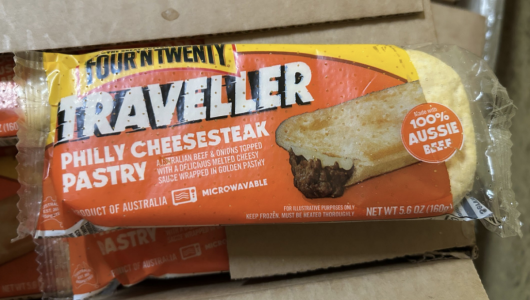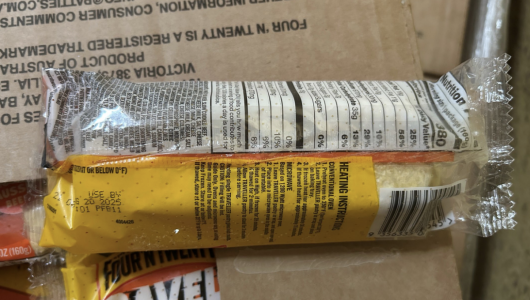Heads-up, shoppers! Urgent recall issued for popular pastries
- Replies 0
If you’re a fan of savory snacks or have a soft spot for a good Philly cheesesteak, this is an alert you won’t want to miss.
The US Department of Agriculture’s Food Safety and Inspection Service (FSIS) has just announced a recall that could affect you or someone you know—especially if you’ve recently picked up a quick bite from a Pennsylvania convenience store.
Whether you’re stocking up for a family gathering or just treating yourself to a tasty pastry, you deserve to know exactly what’s in your food—and that it’s been properly inspected. Let’s break down what’s happening, why it matters, and what you should do next.
What’s Been Recalled—and Why?
The recall centers on 127 pounds of “FOUR ‘N TWENTY TRAVELLER PHILLY CHEESESTEAK PASTRY” products, imported from Australia by California-based Fijian Import & Export Co. Inc.
These ready-to-eat meat pies were brought into the US on or around May 1, 2025, and distributed to convenience stores in Pennsylvania.
Here’s the key issue: these pastries were not presented for the required FSIS reinspection when they entered the country. That means they skipped a crucial step designed to ensure imported meat products are safe, wholesome, and properly labeled.
While there have been no reports of illness or adverse reactions so far, the lack of inspection means there’s no guarantee these products meet US safety standards.

How to Identify the Recalled Product
If you’ve recently purchased a Philly cheesesteak pastry, check your freezer or fridge for the following:
Also read: Don’t eat this chip until you’ve seen the latest recall warning
What Should You Do?
The FSIS is urging all consumers to take this recall seriously. If you have any of the affected pastries, do not eat them. Instead, you have two options:
1. Throw them away—safely discard the product so it can’t be accidentally consumed.
2. Return them to the place of purchase—most stores will offer a refund for recalled items.
If you’re concerned about any symptoms or reactions after eating the product, contact your healthcare provider right away. While no illnesses have been reported, it’s always better to err on the side of caution.

Why Food Inspections Matter—Especially for Imported Products
You might be wondering: “Isn’t all food in stores safe?”
In the US, the FSIS is responsible for making sure that all meat, poultry, and egg products—whether made here or imported—are safe to eat.
Imported foods must go through a reinspection process to catch any issues that might have slipped through in their country of origin.
When a product skips this step, it’s not just a paperwork problem. It means there’s a risk that the food could be contaminated, mislabeled, or otherwise unsafe. That’s why recalls like this are taken so seriously, even if no one has gotten sick yet.
Also read: URGENT RECALL: Popular pantry staples pulled over hidden allergens—are these in your kitchen?
What Happens Next?
The FSIS is working with Fijian Import & Export Co. Inc. to make sure all affected products are removed from store shelves and that consumers are notified. They’re also conducting recall effectiveness checks to ensure the process is thorough.
If you have questions about the recall, you can contact the company directly at [email protected].
For updates and a list of stores that received the product, visit the FSIS website at www.fsis.usda.gov/recalls.
Read next: Tomato recall linked to salmonella: What you need to know to stay safe

Have you ever been affected by a food recall? Do you have tips for keeping your kitchen safe and organized? Or maybe you have a favorite Philly cheesesteak recipe you’d like to share? We’d love to hear your stories and advice in the comments below!
The US Department of Agriculture’s Food Safety and Inspection Service (FSIS) has just announced a recall that could affect you or someone you know—especially if you’ve recently picked up a quick bite from a Pennsylvania convenience store.
Whether you’re stocking up for a family gathering or just treating yourself to a tasty pastry, you deserve to know exactly what’s in your food—and that it’s been properly inspected. Let’s break down what’s happening, why it matters, and what you should do next.
What’s Been Recalled—and Why?
The recall centers on 127 pounds of “FOUR ‘N TWENTY TRAVELLER PHILLY CHEESESTEAK PASTRY” products, imported from Australia by California-based Fijian Import & Export Co. Inc.
These ready-to-eat meat pies were brought into the US on or around May 1, 2025, and distributed to convenience stores in Pennsylvania.
Here’s the key issue: these pastries were not presented for the required FSIS reinspection when they entered the country. That means they skipped a crucial step designed to ensure imported meat products are safe, wholesome, and properly labeled.
While there have been no reports of illness or adverse reactions so far, the lack of inspection means there’s no guarantee these products meet US safety standards.

The US Department of Agriculture’s FSIS has announced a recall of 127 pounds of Philly cheesesteak pastries imported from Australia by Fijian Import & Export Co. Inc because they were not presented for the required inspection. Image source: FSIS.
How to Identify the Recalled Product
If you’ve recently purchased a Philly cheesesteak pastry, check your freezer or fridge for the following:
- Product Name: FOUR ‘N TWENTY TRAVELLER PHILLY CHEESESTEAK PASTRY
- Package Size: 5.6 oz.
- Use By Date: AUG 20 2025 (printed on the packaging)
- Australia Establishment Number: 256
- Australia Inspection Mark
Also read: Don’t eat this chip until you’ve seen the latest recall warning
What Should You Do?
The FSIS is urging all consumers to take this recall seriously. If you have any of the affected pastries, do not eat them. Instead, you have two options:
1. Throw them away—safely discard the product so it can’t be accidentally consumed.
2. Return them to the place of purchase—most stores will offer a refund for recalled items.
If you’re concerned about any symptoms or reactions after eating the product, contact your healthcare provider right away. While no illnesses have been reported, it’s always better to err on the side of caution.

Consumers in possession of these products are urged not to consume them, but to discard them or return them to the place of purchase for a refund, as there has been no report of illness linked to the product so far. Image source: FSIS.
Why Food Inspections Matter—Especially for Imported Products
You might be wondering: “Isn’t all food in stores safe?”
In the US, the FSIS is responsible for making sure that all meat, poultry, and egg products—whether made here or imported—are safe to eat.
Imported foods must go through a reinspection process to catch any issues that might have slipped through in their country of origin.
When a product skips this step, it’s not just a paperwork problem. It means there’s a risk that the food could be contaminated, mislabeled, or otherwise unsafe. That’s why recalls like this are taken so seriously, even if no one has gotten sick yet.
Also read: URGENT RECALL: Popular pantry staples pulled over hidden allergens—are these in your kitchen?
What Happens Next?
The FSIS is working with Fijian Import & Export Co. Inc. to make sure all affected products are removed from store shelves and that consumers are notified. They’re also conducting recall effectiveness checks to ensure the process is thorough.
If you have questions about the recall, you can contact the company directly at [email protected].
For updates and a list of stores that received the product, visit the FSIS website at www.fsis.usda.gov/recalls.
Read next: Tomato recall linked to salmonella: What you need to know to stay safe
Key Takeaways
- The US Department of Agriculture’s FSIS has announced a recall of 127 pounds of Philly cheesesteak pastries imported from Australia by Fijian Import & Export Co. Inc because they were not presented for the required inspection.
- The recalled products are 5.6 oz “FOUR 'N TWENTY TRAVELLER PHILLY CHEESESTEAK PASTRY” with a use by date of 20 August 2025, Australia establishment number 256, and were sold through convenience stores in Pennsylvania.
- Consumers in possession of these products are urged not to consume them, but to discard them or return them to the place of purchase for a refund, as there has been no report of illness linked to the product so far.
- The FSIS routinely conducts checks to ensure recalls are effective, and anyone with concerns about illness after consumption should contact a healthcare provider, while queries about the recall can be directed to the company by email.
Have you ever been affected by a food recall? Do you have tips for keeping your kitchen safe and organized? Or maybe you have a favorite Philly cheesesteak recipe you’d like to share? We’d love to hear your stories and advice in the comments below!






